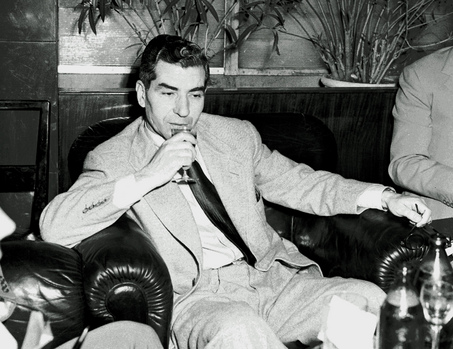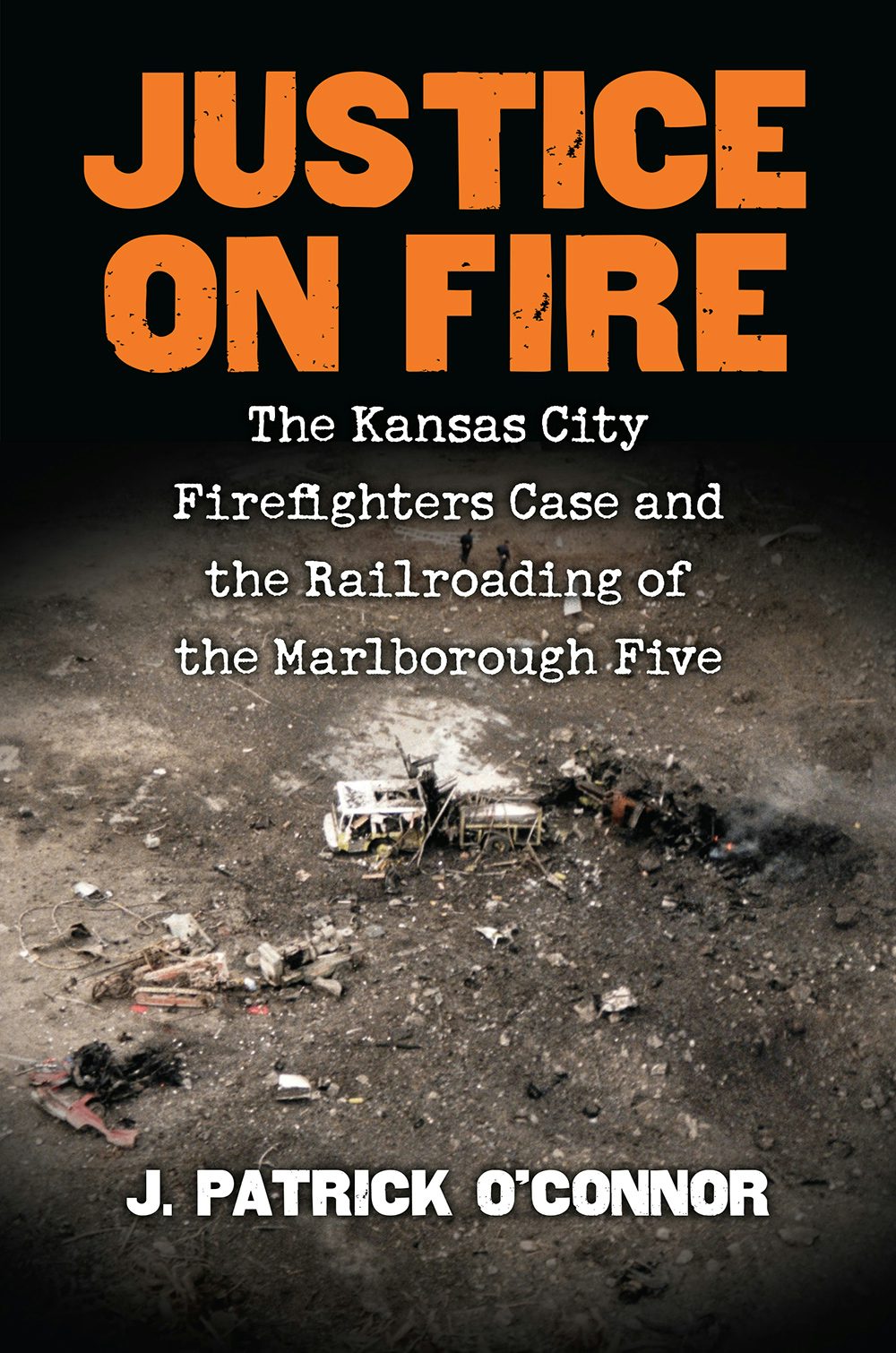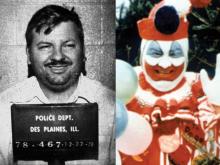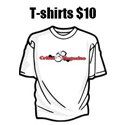
Charles "Lucky" Luciano
Lucky Luciano briefly reestablished himself as the "boss of bosses" at the mob's summit in Havana, but before he could consolidate his power the U.S. government forced the Cuban government – under threat of a medical-supplies boycott -- to deport him to Sicily. When he finally did make it back to New York in 1962, his remains were in a coffin.
by Allan May
The year 1946 was a busy one for Mafia chieftain Charles "Lucky" Luciano. He was released from prison after serving 10 years, deported and paroled to his native Sicily, and, within eight months, had made it all the way to Havana, Cuba as part of his plan to get back to the United States. This stopover, on the way to his intended final destination – New York City – would be the site of an important mob summit – the "Havana Conference" – and would bring the wrath of the U.S. government down on the tiny island. The Feds made it clear that having Luciano just 90 miles from the U.S. mainland was too close and demanded that Cuban officials send him back to Italy.
The following is a concise chronology of events regarding Thomas E. Dewey's pursuit of Luciano until Luciano's arrival in Havana, Cuba:
January 31, 1936 – Special Prosecutor Dewey, who built his political career around prosecuting high-profile mob figures, begins making raids and arrests on New York City's houses of prostitution.
February to March 1936 – The investigation continues, culminating with a 90-count indictment against Luciano and 15 others. Luciano flees New York City for Hot Springs, Ark., where he is under the protection of Owney Madden.
April 1, 1936 – Luciano is arrested in a Hot Springs gambling club. After legal proceedings are completed, Luciano is extradited to New York City.
May 13, 1936 – Luciano's trial gets underway. The defense learns that three fellow defendants have agreed to testify for the government against Luciano.
June 7, 1936 – A jury finds Luciano guilty on 62 counts of compulsory prostitution. He is sentenced to a prison term of 30-to-50 years.
June 18, 1936 – Luciano enters Dannemora Prison in upstate New York.
June 1936 to May 1942 – Luciano languishes in Dannemora, known as the Siberia of the New York prison system. In 1938 and 1942 he is turned down for parole.
February 9, 1942 – The transatlantic liner S. S. Normandie is sabotaged in New York harbor.
May 12, 1942 – Luciano is transferred to Great Meadow Prison, close to New York City, after agreeing to provide protection from German saboteurs on the New York docks. He also helps by getting word to his Mafia counterparts in Sicily to help during the Allied invasion there.
May 7, 1945 – With the war in Europe over, a petition for executive clemency and freedom for Luciano is sent to now Gov. Thomas Dewey, who agrees to a reduction of sentence, not a pardon.
January 3, 1946 – Dewey announces that Luciano will be released, but deported. He will be paroled to his native Sicily.
February 2, 1946 – Luciano is released from Great Meadow Prison. He is taken to Ellis Island.
February 9, 1946 – Luciano boards the Laura Keene to set sail for Genoa, Italy. A huge party is held for him on board. After a two-week voyage, the boat arrives in Italy.
February to October 1946 – Luciano is first moved to his hometown of Lercara Friddi, Sicily. His travels then take him to Palermo, Sicily; to Naples, Italy; and finally Rome.
October 1946 – After obtaining two passports, Luciano secretly boards a freighter, which takes him to Caracas, Venezuela. He flies to Mexico City and then books a private plane for a flight to Havana, Cuba.
Upon arriving in Havana, Luciano is picked up by childhood friend Meyer Lansky and taken to the Hotel Nacional where he registers under his real name – Salvatore Lucania – in a luxurious suite that Lansky has reserved for him. In The Last Testament of Lucky Luciano, Luciano recalls that for the first time since his imprisonment in 1936 that "there was no handcuffs on me and nobody was breathin' over my shoulder." Plus the mob leader said he felt he had spread enough money around and had taken the necessary precautions on his sojourn to Havana to avoid arousing the suspicions of Harry Anslinger of the Bureau of Narcotics and Dewey.
Before returning to Miami, Lansky scheduled a major mob confab at the Hotel Nacional for the week of Dec. 22, 1946. Luciano moved out of the hotel and into a spacious home in the Havana suburb of Miramar. Lansky shuttled back and forth between Miami and Havana, keeping Luciano informed of the upcoming meeting and making plans for Lucky to enjoy an extended stay in Cuba. He suggested that Luciano purchase an interest in the casino at the Hotel Nacional, controlled jointly by Lansky and Cuban politician Fulgencio Batista, for $150,000. Instead of paying that amount out of his own pocket, Luciano recounted to his biographers that he told Lansky that invitees to the Dec. 22 meeting would "bring envelopes to welcome me back again across the Atlantic." These "Christmas presents" totaled over $200,000, which Luciano used to purchase an interest in the casino.
Luciano's long-range plan was to induce Dewey to rescind his deportation. Luciano figured the best way to accomplish this was for him and his associates to provide financial backing for Dewey's presidential campaign in 1948. Once elected President, Luciano expected Dewey to show his appreciation for Luciano by rescinding the deportation order. While waiting the two years for this to happen, Lansky negotiated six-month extensions of Luciano's visa with the Cuban minister of the Interior.
One week prior to the Dec. 22 meeting, Vito Genovese arrived to see Luciano. The two men had been friends since the 1920s. When the five New York families were established in 1931, Luciano selected Genovese to serve as his underboss. Luciano would soon come to realize that Genovese was a conniving, greedy, backstabbing individual. He quickly lost all respect for him. Shortly after Luciano's arrest on prostitution charges, Genovese became acting boss, but only briefly. He soon fled to Italy to avoid a murder indictment. In 1945, Genovese was apprehended in Italy by an agent of the Criminal Investigation Division of the U.S Army and extradited to Brooklyn to stand trial. When the key witness against Genovese was poisoned in his jail cell, Genovese was released on June 11, 1946, just six months before the Havana meeting.
Luciano knew why Genovese was there. Lansky had informed Luciano that Genovese was trying to muscle in on Albert Anastasia. According to The Last Testament of Lucky Luciano, Genovese opened the discussion by saying Anastasia needed to be eliminated because he was thinking about killing Harry Anslinger. Luciano rebuked Genovese and pointed out that Vito was the one interested in pushing narcotics, not Anastasia.
The next item on Genovese's agenda was to ask Luciano to retire. Things were changing in New York City and Luciano was too far away to run the criminal organization effectively. Luciano replied, "Right now you work for me and I ain't in the mood to retire. Don't you ever let me hear this again, or I'll lose my temper."
As the other "delegates" arrived for the meeting they checked into rooms set aside for them by Lansky on the top four floors of the Hotel Nacional. (See list of participants at the end of the article.) Lansky also had reserved the hotel's mezzanine for meetings, banquets and parties for the group. In The Last Testament, Luciano states that after the mobsters checked in they paid him a visit in Miramar to "reaffirm loyalty, and acknowledge him as chairman of the board." The first night a dinner was hosted by Lansky, Frank Costello, and Joe Adonis as a "public showing of their private affirmations," where all the attendees came forward with envelopes filled with cash for Luciano.
The following morning the Havana Conference was underway. Luciano recounted that he sat at the head of a large rectangular table with Lansky, Costello, Genovese and Adonis at his side. Other than this arrangement, there was no protocol for the seating. Luciano opened the meeting by thanking the boys for their monetary donations. He said the money would be invested in the hotel's casino. He then explained that since he had left Italy that he needed to be addressed and referred to as Salvatore Lucania so as not to draw attention to the former Charles "Lucky" Luciano.
Luciano then brought up the subject of the "boss of bosses" title in which he "casually mentioned" that he felt it was time for him to don that designation. Anastasia stood up to second the notion, but not before glaring over at Genovese. "For me, you are the Big Boss, whether you like it or not. That's the way I look at it, and I would like to hear from anybody who don't feel the same way."
There was silence in the room. Luciano claims, "That was all I was after – first, to teach Vito a lesson in public without him losin' face and also to get the title without havin' to fight for it. So I won my first point, and frankly, I didn't give a shit what happened after that."
For the next order of business, Luciano informed the others that he had heard rumors of infighting between Anastasia and Genovese. He told the two adversaries that they needed to work out their differences in order to avoid the problems that occurred between Joe Masseria and Salvatore Maranzano, which resulted in the Castelammarese War in 1930-31.
He next spoke about his feelings regarding the narcotics trade. "I told 'em I want 'em to get the hell outa that business, to stop it right then and there, and to forget it." This admonition fell on deaf ears. As the discussion continued about the huge sums of money that could be made from drugs, Luciano could see this was a conflict he was not going to win. Soon Costello leaned over and whispered, "Charlie, don't hit your head against the wall. Vito rigged it before the meet started. Try to get out of it as soon as you can. Someday, they'll all be sorry."
This discussion was followed by what Lansky introduced as "The Siegel Situation." Benjamin "Bugsy" Siegel had not been informed of, or invited to, the meeting mainly because he would be chief among the topics covered. Sent out to the West Coast in the mid-1930s to oversee the New York mob's gambling and labor racketeering interests, Siegel quickly became a Hollywood mob celebrity. He later became preoccupied with constructing a grandiose hotel and casino in the small town of Las Vegas in Nevada, a state that had legalized gambling. Working through Lansky he got the New York mob to finance the Flamingo. The original cost had been calculated at $1.5 million. However, a year later, either through the bungling or dishonesty of Siegel, the price tag had risen to $6 million.
Although not yet completed, Siegel set a date of December 26, 1946 for the casino's grand opening. Lansky reported he had information that Siegel's girlfriend, Virginia Hill, had been making trips abroad to deposit money in a Zurich bank account. Although friends since childhood, Lansky said he believed his old partner would skim even more money and possibly flee the country if the Flamingo was a bust.
Luciano says a vote was taken, minus Lansky and Phil Kastel who were both Jewish, and it was decided that Siegel, also Jewish, was to be killed. The contract was given to Charles Fischetti of Chicago to be carried out by Los Angeles Family boss Jack Dragna. In a possible attempt to save Siegel, Lansky suggested that they wait until after the grand opening, which was just days away.
Christmas Eve arrived and the meeting's participants took a break. The wives and girlfriends of the mobsters had arrived and a grand party was held at the hotel in honor of singer Frank Sinatra, then a rising star who had traveled to Havana with the Fischetti brothers.
On the day after Christmas, the meeting reconvened in the evening because everyone was anxious to hear how the opening at the Flamingo had been received. Due to the three-hour time differential between the two cities, it was well after midnight before the first reports were received. Rain and cold weather had prevented planes from bringing customers in from Los Angeles and the opening was considered a disaster.
Despite the flop, Lansky convinced the group that he could salvage the project. The Flamingo closed, work was completed, and it reopened a couple of months later. It would soon become a financial success and mobsters across the country would become rich from it and the casinos and hotels that followed. Unfortunately for Siegel, he would not live to see his vision fulfilled. He was cut down by a hit man using a rifle on June 20, 1947 as he sat reading a newspaper on a couch in Virginia Hill's Los Angeles home.
In The Last Testament, Luciano states that following the conclusion of the Havana Conference that Genovese asked him if he could speak to him in private. In Luciano's room Genovese revealed to him that:
"I heard that Washington knows that you're in Havana and they're getting' ready to put the screws to these jerks in Cuba to get you thrown out. There's gonna be so much heat that nobody can do nothin' to help you. Charlie, you're gonna have to get outa here and go back to Italy. By rights, everything that's over there is half mine – and I want it."
Luciano was livid. He was sure that Genovese had gotten word to Washington D.C. that Luciano was in Cuba. At this point Luciano claims he gave Genovese a beating – punching and kicking him, and breaking three of his ribs. He says he intentionally avoided marking his face. It took three days before Genovese could travel. Luciano states he and Anastasia put Genovese on an airplane and warned him that if he ever mentioned the incident to anyone, "then I – Charlie Luciano – will get back into New York, if only long enough to do a final job on you."
Luciano's fears of being discovered were soon realized. Due to a series of events, some caused by Luciano's own indiscretion, the New York newspapers reported his presence in Havana. In February, Harry Anslinger (Luciano would always refer to him as "Asslinger") sent a letter to the Cuban government formally demanding that it deport Luciano to Italy. When the Cuban government balked, Anslinger went to President Harry S Truman and was told to take whatever steps were necessary to force Cuba to deport Luciano.
Anslinger went public and announced that until Luciano was sent packing the United States would put a halt to all shipments of medical supplies to the island. Lansky and Batista met with Luciano and suggested that he leave the country voluntarily so the Cuban officials would not be forced to deport him. Luciano refused, feeling that his position as the leader of the American underworld would be threatened. He hired an attorney who concocted a plan to counter the United States medical-supplies embargo by having Cuba cut off sugar shipments to the United States. This plan of action never materialized and Luciano was arrested on Feb. 23, 1947.
After receiving house arrest for a few days to settle personal matters, Luciano was placed in an immigration lockup while his fate was decided. A last effort by the Cuban government to allow Luciano to seek sanctuary in Caracas, Venezuela was voided by Anslinger who was adamant that the mob boss be shipped back to Italy.
In early March, Luciano was placed aboard the S. S. Bakir, an old Turkish cargo steamer. Traveling through bad weather it took the boat over a month to reach Italy. The boat docked at Genoa on April 11, 1947, and Luciano was immediately arrested.
It would be fifteen years before Luciano would finally get his wish and return to the United States. The journey this time would be in a coffin aboard a Pan American Airway's cargo plane after his death on January 26, 1962. Luciano's remains were claimed by relatives and interred in the family vault at St. John's Cemetery. Ironically, seven years later, Vito Genovese would be buried in a vault just one hundred feet away. Even in death, Luciano could not escape the "greedy bastard" who betrayed him.
Author's note: Most, but not all, of the information for this article comes from The Last Testament of Lucky Luciano, written by Martin A. Gosch and Richard Hammer, which was published 12 years after Luciano's death. Luciano helped dictate much of the book himself during the final months of his life. Since its publication, many factual errors have been found. In Virgil W. Peterson's The Mob: 200 Years of Organized Crime in New York, he writes, "Many statements attributed to Luciano are replete with arrogance, exaggerations, and inaccuracies and must be viewed with skepticism."
While many of Luciano's statements used in this article are self-serving, the topics covered during the meeting have been confirmed by other authors, including George Walsh in Public Enemies; Dan, Landau, and Eisenberg in Meyer Lansky: Mogul of the Mob; Curt Gentry in J. Edgar Hoover: The Man and the Secrets, and in Peter Maas's The Valachi Papers. In Joseph Bonanno's A Man of Honor, he claims that after Luciano was sent to prison in 1936 he never saw Luciano again.
Participants at 1946 Havana Meeting
Name Age in City St. Demise
1946
First set of names are according to The Last Testament of Lucky Luciano:
Accardo, Anthony 40 Chicago IL Died May 27, 1992
Adonis, Joe 44 Brooklyn NY Died Nov. 26, 1972
Anastasia, Albert 43 Brooklyn NY Murdered Oct 25, 1957
Bonanno, Joseph 41 New York City NY Alive as of March 2000
Carfano, Anthony 47 New York City NY Murdered Sept 25, 1959
Costello, Frank 55 New York City NY Died Feb. 18, 1973
Fischetti, Charles 45 Chicago IL Died April 11, 1951
Fischetti, Rocco 43 Chicago IL Died July 6, 1964
Genovese, Vito 49 New York City NY Died Feb. 11, 1969
Kastel, Phil 52 New Orleans LA Suicide Aug 16, 1962
Lansky, Meyer 44 Miami FL Died Jan. 15, 1983
Lucchese, Thomas 46 New York City NY Died July 13, 1967
Luciano, Charles (Lucky) 49 Naples, Italy - Died Jan. 26, 1962
Magaddino, Stephano 55 Buffalo NY Died July 19, 1974
Magliocco, Giuseppe 48 Brooklyn NY Died Dec. 30, 1963
Marcello, Carlos 36 New Orleans LA Died March 2, 1993
Miranda, Mike 50 New York City NY Died 1973
Moretti, Willie 52 Newark NJ Murdered Oct 4, 1951
Profaci, Giuseppe 50 Brooklyn NY Died June 7, 1962
Trafficante, Santos 32 Tampa FL Died March 17, 1987
Listed in some books as being there:
Dalitz, Morris 48 Las Vegas NV Died Sept. 1, 1989
Stacher, Doc Israel - Died March 1977
Zwillman, Abner (Longy) 47 West Orange NJ Suicide Feb 27, 1959
Notes to this listing:
- It is interesting that New York family leaders Gaetano "Tom" Gagliano, Vincent and Philip Mangano were not listed among the attendees.
- Chicago mob leaders Paul Ricca and Louis Campagna would probably have been in attendance had they not been serving prison terms.
- The last three names on the list came from other sources, not Luciano's book. However, Luciano, in his narrative specifically points out that Lansky and Kastel were the only non-Italians in attendance. Zwillman's biographer, Mark Stuart, never mentions the Havana Conference in his book Gangster #2.
Allan May's e-mail address is: AllanMay@worldnet.att.net








